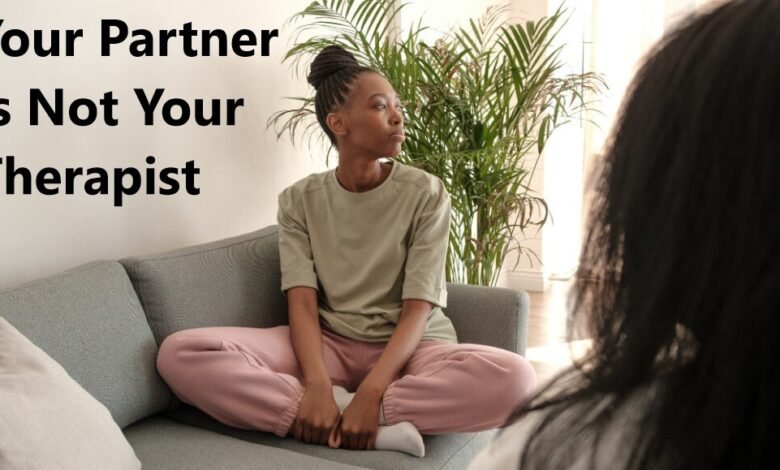Your Partner Is Not Your Therapist

Your Partner Is Not Your Therapist
When we are in a romantic relationship, it is natural to want to share everything with our partner. We may feel that they are the one person who truly understands us and can provide the emotional support we need. However, it is important to recognize that your partner is not your therapist.
While it is healthy and necessary to have emotional support from our partners, relying on them to be our sole source of support can be detrimental to both the relationship and our own mental health.
Here are a few reasons why:
Your partner is not a trained professional.
Therapists are highly trained professionals who specialize in helping individuals navigate their emotions and mental health. While your partner may be supportive and loving, they likely do not have the same level of expertise as a therapist. It is unfair to put the burden of your mental health solely on your partner when they do not have the same training and tools as a professional.
It can put a strain on the relationship
When we rely on our partners to be our therapists, it can create an imbalance in the relationship. Your partner may begin to feel overwhelmed and burdened by your emotional needs, especially if they are struggling with their own mental health. This can lead to resentment and strain on the relationship.
You may not be getting the help you need
While it can be comforting to have your partner there to listen and support you, they may not be able to provide the help you truly need. Therapists are trained to help individuals work through their emotions and develop coping strategies. Your partner may be able to provide a listening ear, but they may not have the skills to help you work through your issues in a productive way.
Here are some tips about why your partner is not your therapist:
- Avoid relying solely on your partner for emotional support: While it’s natural to turn to your partner for comfort and reassurance during difficult times, it’s important to recognize that they have their own needs and limitations. Relying too heavily on your partner for emotional support can put a strain on your relationship and create an unhealthy dynamic.
- Seek professional help if needed: If you’re struggling with mental health issues or have experienced significant trauma, it’s important to seek professional help. While your partner may provide a supportive and caring environment, they may not have the necessary training or expertise to help you work through complex emotional issues.
- Maintain a balance in your relationship: It’s important to maintain a healthy balance in your relationship by engaging in activities and hobbies outside of your partnership. This allows you to maintain your own identity and interests, which can help reduce your reliance on your partner for emotional support.
- Be mindful of your partner’s boundaries: Your partner may not always be in the right headspace to provide emotional support. It’s important to be mindful of their boundaries and recognize when they need their own space or support.
- Communicate openly and honestly: If you’re struggling with emotional issues, it’s important to communicate openly and honestly with your partner. Let them know how they can support you, but also be open to their needs and limitations.
- Take responsibility for your own emotional wellbeing: While your partner can be a valuable source of support, it’s important to take responsibility for your own emotional wellbeing. This may involve engaging in self-care practices, seeking professional help, or finding other sources of support such as friends, family members, or support groups.
Conclusion
In conclusion, while it is natural to rely on our partners for emotional support, it is important to remember that they are not a substitute for professional therapy. Expecting our partners to act as our therapists can place an unnecessary burden on our relationships and hinder our individual growth.
Therapy offers a safe and confidential space to work through complex emotions and underlying issues with the guidance of a trained professional. It is important to recognize the limitations of our relationships and seek the appropriate support when necessary to maintain healthy and fulfilling connections with our partners.
By prioritizing our own mental health and seeking therapy when needed, we can improve our overall wellbeing and strengthen our relationships with those we love.
Frequently Asked Question
- What does it mean when someone says “your partner is not your therapist”?
This means that while it’s natural to turn to your partner for emotional support, they may not have the necessary training or expertise to help you work through complex emotional issues.
2. How can I know if I need professional help instead of relying solely on my partner for emotional support?
If you’re struggling with mental health issues or have experienced significant trauma, it’s important to seek professional help. Signs that you may need professional help include persistent feelings of sadness or anxiety, difficulty functioning in daily life, and a lack of interest in activities you once enjoyed.
3. Can my partner provide any emotional support at all?
Yes, your partner can provide emotional support. However, it’s important to maintain a healthy balance in your relationship and recognize when you need professional help.
4.What are some alternative sources of emotional support?
Alternative sources of emotional support may include friends, family members, support groups, or professional therapists.
5. How can I communicate my emotional needs to my partner without relying on them as my therapist?
It’s important to communicate openly and honestly with your partner about your emotional needs. Let them know how they can support you, but also be open to their needs and limitations.
6. What if I feel like I can’t afford professional help?
There are many low-cost or free resources available for individuals who need professional help. You can check with your insurance provider or local mental health clinic for more information.











